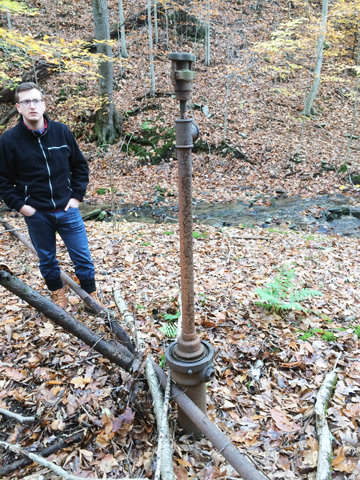GSPIA Professor Receives Grant to Study Abandoned Oil and Gas Wells
The Mascaro Center for Sustainable Innovation and the Pitt Sustainability Task Force has awarded a grant to GSPIA Associate Professor Jeremy Weber to study the costs associated with abandoned oil and gas wells. In this pilot study, Weber, and Assistant Professor Daniel Bain, Pitt’s Department of Geology and environmental Science, will examine the long-term effects of conventional oil and gas wells on property values and real estate development in Washington County, Pennsylvania.
Previous research indicates that there are hundreds of thousands of abandoned gas and oil wells in the Commonwealth and the state has lacked the resources, will, and strategy to ensure proper reclamation of wells. Moreover, since the Marcellus shale boom, 10,000 unconventional natural gas wells have been drilled in the state.
According to Weber, of these wells, six have been improperly abandoned (see this post on GSPIA’s Energy and Environment blog). However, little is known about the local cost in reclaiming an unconventional gas well. As Weber explained, these wells are deeper than conventional wells, and have horizontal portions that can extend for several miles. This makes the wells costlier to plug and reclaim, with some estimates reaching $1 million or more per well.
Pennsylvania, like many states, requires operators to set aside funds before drilling a well, which are forfeited to the state if the well is not properly reclaimed. The state’s current bonding requirements are small relative to the cost of reclaiming an unconventional well, meaning that bonding requirements provide insufficient incentive for companies to reclaim wells and, in the event that the company abandons the well, insufficient resources for the state to reclaim it.
Weber’s study, which will involve GSPIA PhD student Max Harleman, will attempt to quantify the long-term effects of oil and gas wells on communities, with a focus on the costs of abandoned wells as indicated by property values or real estate development. According to Weber, documenting the legacy costs of abandoned wells matters for decisions to address a long-standing problem, but its greatest value may be in motivating policies that avert a greater future problem.
Photo caption: GSPIA student Ion Simonides (Energy and Environment major) examines an abandoned well in northwest Pennsylvania.

